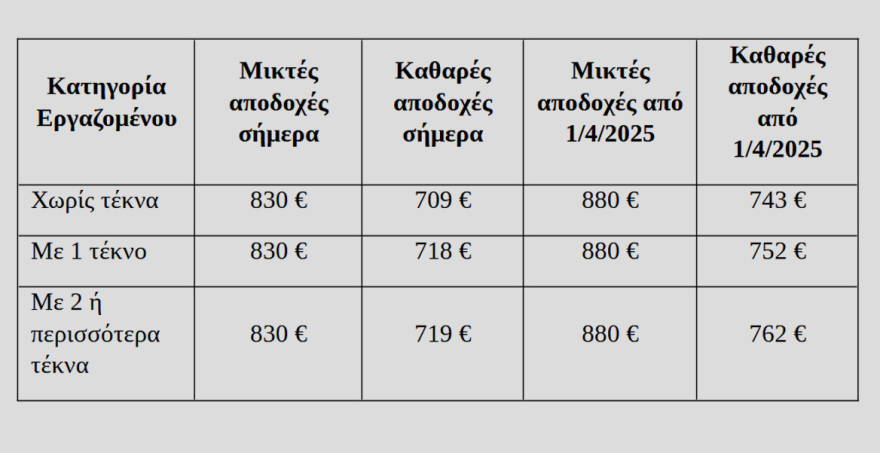In 880 euros It was announced that the minimum wage was increasing. The increase, as Prime Minister Kyriakos Mitsotakis said in his presentation to the cabinet, will be in force on April 1st and has been leveraging 19 benefits and the import salary in the State.
See the Prime Minister’s announcements:

As government sources note with the new increase, the minimum wage will be increased by 35.4% compared to 2019.
In particular, on the recommendation of the relevant ministers to the Council of Ministers, the minimum wage will increase from 830 to EUR 880 – a minor increase of 6.02% – and there will be a similar increase in the minimum wage from EUR 37.07 to EUR 39.30.
Increasing the minimum wage will apply From April 1st 2025. The main objective is to enhance the disposable income of employees and their purchasing power, to support workers, to improve living conditions and the country’s further economic growth.
It is about 5th increase of basic remuneration from 2019. Cumulative increase in six years is 35.4%. Profit for employees is now equivalent to about 5 additional minimum wages of 2019 per year.
In addition, the total increase in the minimum wage since 2019, by 35.4%, is almost twice as cumulative in inflation of the same period, which stood at 18.1%. That is, it is significantly protected by the real income of the workers.
Greece is currently in 11th place among the 22 EU Member States who have a minimum wage. The goal of the government is for the minimum wage to reach 950 euros in 2027.
By increasing the minimum wage and wage benefit more than 1.6 million citizens directly among which:
-more than 575 thousand workers paid with minimum wage in the private sector,
-Co -public employees who will also see an increase,
-Those who receive benefits depending on the minimum wage (such as maternity, marriage, parental license, unemployment), and three years are also involved.
-This year’s increase is accompanied by an institutional section: for the first time the protection of the minimum wage extends to the State, as it will be the introductory salary for civil servants. As a result of the connection, the remuneration of civil servants will rise horizontally by 30 euros this year and further increases in the coming years.
-Comparing all interventions made for civil servants’ salaries by 2023, the average increase is EUR 2,283 per year, equivalent to additional salaries per year.
-Fter, the minimum wage also affects the formation of the average salary
At the same time, government sources noted that this was the first application of the recent law on the formation of the minimum wage, which upgraded the role of social partners in the process of setting the minimum wage, and for the first time this increase is also concerned with civil servants. The minimum wage now acts as a security net for all employees in the country, since the new law provides that there can be no reduction.
It is noted that by 2028, the minimum wage will automatically increase in a mathematical formula, taking into account ELSTAT’s objective data on inflation and increased productivity of the economy.
Examples
• The gross increase in the minimum wage that will apply from 1st/4/2025 will amount to € 50:
• This corresponds to a monthly net increase of 34 € for employees without children, no other income and € 43 for employees with 2 or more children without other income, after payment of insurance contributions and income tax.
• On an annual basis (14 salaries), the net benefit of employees is € 473 (no children) and 606 € (with 2 or more children).
• Overall since December 2019, these employees receive an additional net of € 195 (no children) and € 215 (with 2 or more children) each month, and € 2,735 (no children) up to € 3,010 (with 2 or more children) per year.


